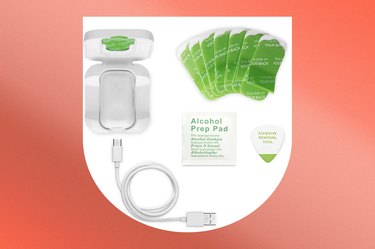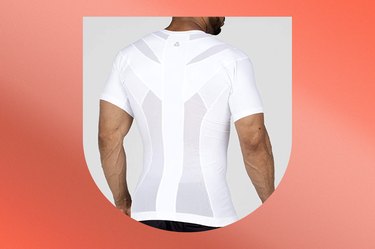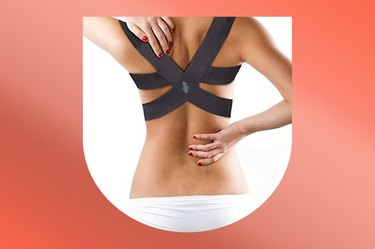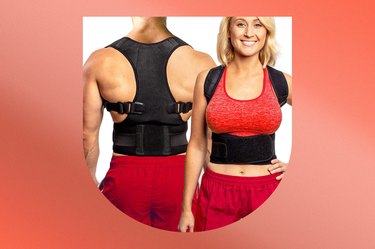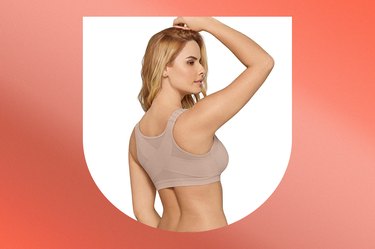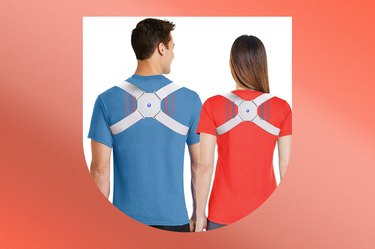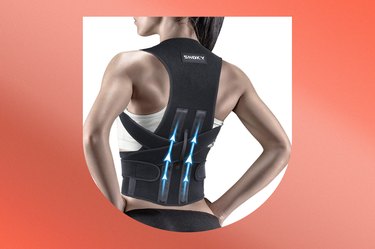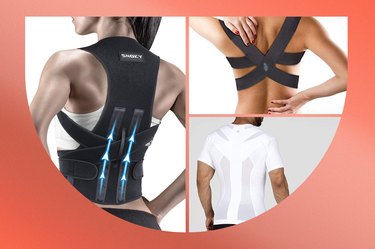
The hazards of lousy posture are many — there's back and neck pain, of course, but headaches and trouble with breathing are on the list, too. Luckily, if you're prone to slouching, finding the best posture corrector for you may help you stand (and sit) a little straighter.
The perfect posture corrector for you will target the area where you need the most support, should be easy and comfortable to use and made of soft material that's both flexible and durable, says Gregory Funk, DC, founder of Ideal Health Chiropractic in Denver.
Video of the Day
Just as important, the best posture correctors encourage you to do at least some of the work using your own muscles.
"A device should emphasize active participation from the patient," Alexandra Trevisan, DC, a chiropractor at Blake Physical Therapy in Los Angeles, tells LIVESTRONG.com.
Being forced to engage your muscles will help them grow stronger so eventually, you can sit or stand up straight without a corrector.
These seven picks meet the experts' recommendations and have racked up top ratings from reviewers. With regular use, you can count on them to help you get your posture to a stronger place — and feel better overall.
The Best Posture Correctors
- Best Overall: Upright GO 2 ($59.95, Amazon)
- Best Posture Corrector for Men: Alignmed Posture Pullover Shirt ($94.99, Amazon)
- Best Posture Corrector for Women: Berlin & Daughter Posture Corrector ($29.95, Amazon)
- Best Posture Corrector for Back Pain: FlexGuard Support Back Brace Posture Corrector ($22.49, Amazon)
- Best Posture Corrector Bra: Leonisa Front Closure Posture Corrector Bra ($50, Amazon)
- Best Posture Corrector for Neck: Posture Perfect Original Posture Corrector ($29.95, Amazon)
- Best Brace: Frii Posture Corrector Back Brace ($13.99, Amazon)
A Note on Language
LIVESTRONG.com tries to avoid using gendered language. However, some retailers market their products to a specific gender, which is why we use the terms "men" and "women" below.
1. Best Overall Posture Corrector: Upright GO 2
Pros
- Tracks your progress
- Targets shoulder and upper back posture
- Connects to your smartphone
Cons
- You need a smartphone to use it
- It may vibrate when you lean forward and back, even if you're not slouching
- It may not be as effective for neck- or hip-related postural issues
Stick the small adhesive, battery-operated sensor on the middle of your upper back, where it'll give off a gentle vibration any time you start to slouch so you can straighten up.
Download the corresponding app to get real-time feedback on your position, set posture-training goals and track your progress over time.
According to the brand, you'll train yourself to start standing or sitting straighter in as little as two weeks. And the more than 2,500 five-star reviews echo this claim, with many users stating that the product has been the most effective tool to help combat their slouching.
Buy it: Amazon; Price: $59.95
2. Best Posture Corrector for Men: Alignmed Posture Pullover Shirt for Men
Pros
- You can wear it under clothes or on its own
- It's supportive
Cons
- It can be hard to take off
- It can feel too tight for some people
This stretchy, breathable shirt (that boasts a more than 4-star rating overall) features an anatomically constructed tension panel designed to keep your core and back muscles activated to promote better posture. It's aimed at helping wearers maintain proper form and avoid injury during exercise (and has vented mesh panels to keep you cool when you sweat).
But the soft, flexible design works just as well when you're not exercising to deliver back and core support without actually forcing you into a straight position.
Buy it: Amazon; Price: $94.99
3. Best Posture Corrector for Women: Berlin & Daughter Posture Corrector
Pros
- There are multiple ways to wear it
- You can wear it over or under clothes
- Doesn't restrict breasts
Cons
- Doesn't come in plus sizes
- Material may feel scratchy or cause sweating
While anyone can use this corrector, the lightweight material, adjustable straps and open chest make it particularly comfortable for smaller bodies and people with breasts — comfortable (and effective) enough to garner more than 1,500 5-star reviews.
It's easy to put on — just loop your arms through the straps like a backpack and fasten the other set of straps around your chest and waist. Just as good, it's supportive without feeling restricting.
The fabric is soft and stretchy, but a multi-strap design across the upper back still gives you a gentle lift.
Buy it: Amazon; Price: $29.95
4. Best Posture Corrector for Back Pain: FlexGuard Support Back Brace Posture Corrector
Pros
- Adjustable
- Targets back postural issues
Cons
- Doesn't come in plus sizes
- May not tackle neck postural issues as effectively
Shoulder straps and a waist belt help keep both your shoulders and core in position, alleviating both upper and lower back pain — all of which contribute to this device's 4-star rating.
The material is sturdy while still being flexible, breathable and stretchy, so it encourages your muscles to do much of the work. (And you can wear it for long periods.)
The straps around the chest and core are fully adjustable too, so it's easy to get a good fit.
Buy it: Amazon; Price: $22.49
5. Best Posture Corrector Bra: Leonisa Front Closure Posture Corrector Bra
Pros
- Designed specifically for people with breasts
- Supportive
- Wireless
Cons
- Doesn't come in cup sizes larger than DD
This highly rated (with nearly 1,500 five-star reviews, to be exact) posture corrector looks like a sports bra, but it's actually a sturdy compression garment that can help you stand a little straighter.
Criss-cross bands sewn into the back of the bra encourage you to pull your shoulders back, and the adjustable front-hooks and straps ensure you can get a snug, supportive fit.
And the fact that it's totally wireless and has breathable mesh panels around the underarms means it really is comfortable enough to wear all day.
Buy it: Amazon; Price: $50
6. Best Neck Posture Corrector: Posture Perfect Original Posture Corrector
Pros
- Adjustable
- You can wear it over or under clothes
- Targets neck, back and shoulder postural issues
Cons
- May be tricky to adjust to your exact size at first
Most dedicated neck braces are designed for providing serious stability for injuries. But that's too much support if you're just looking for some help in the posture department.
This 5-star-rated device doesn't have a sensor, but offers enough support to keep you standing straight all day. This corrector has soft, stretchy straps across your upper back. The extra support near your neck gives extra guidance to your upper body — helping keep it in the healthiest position.
Buy it: Amazon; Price: $29.95
7. Best Posture Corrector Brace: Frii Posture Corrector Back Brace
Pros
- You can wear it over or under clothes
- Provides lower back support
Cons
- Doesn't come in plus sizes
Most longline braces have stiff metal or plastic running down the back, which can be uncomfortable and actually encourage your core and back muscles to grow weaker instead of stronger (more on that below).
But this one is made of very sturdy fabric, designed to wrap around your shoulders, the entire length of your back and your core. And because it's less restrictive than a firmer brace, it encourages your muscles to do more of the work of holding you up.
Buy it: Amazon; Price: $13.99
6 Things to Know Before You Buy a Posture Corrector
Have another pick in mind, or not sure one of the recs above will be just right? Sticking with a few simple shopping tips will help you find the best posture corrector for you.
1. Make Sure It's Easy to Use
You're less likely to use a corrector consistently if it's tough to put on or take off. And if you're not wearing it on the reg, it won't help you.
"You shouldn't have to rely on having another person around to adjust the corrector to your needs," Funk says.
2. Make Sure It Targets the Right Spot
Wearing a neck-focused posture corrector when you have low back pain likely won't fix your aches (and vice versa). Accordingly, make sure the device you pick is intended for the area that gives you the most trouble, per the Hospital for Special Surgery (HSS).
3. Consider Your Daily Activities
The type of posture corrector you end up picking should suit your daily needs, according to the HSS. For instance, if you want a device you can wear while you're on the go, a heftier brace might not be for you. On the flip side, if you want something sturdy to help remedy back pain, a flimsier device may not do the trick.
4. Pick a Corrector That Makes You Do (Most) of the Work
The best correctors don't actually make you stand or sit up straight. They remind you to do it yourself, usually with a gentle vibration or buzz, Trevisan says. That'll help you form healthier posture habits and strengthen your back and core muscles — so you'll still stand or sit tall even when you take the corrector off.
5. Stick With Softer Materials
Worry that a reminder device won't quite cut it? If you want a corrector that physically nudges you in the right position, opt for one made primarily of soft, stretchy materials like spandex, latex, rubber or cotton.
"You want to avoid correctors that are stiff or rigid because they can make the muscles in the spine atrophy or become lazy," says Amir Vokshoor, MD, spinal neurosurgeon and Chief of Spine at St. John's Hospital in Santa Monica, California.
Softer materials are more comfortable than their rigid counterparts, upping the odds that you'll wear the corrector regularly enough to see results.
The one exception? A rigid device might be right if you're dealing with spinal instability from severe trauma or fracture healing, Dr. Vokshoor says. In that case, it's essential to work with your doctor to pick a safe, supportive posture corrector that will help your body heal.
6. Run It by Your Doc Before You Buy
See what your doctor thinks before plunking down your card or cash.
Your doctor or an orthopedist will be able to make expert recommendations on a variety of products you might benefit from.
Is this an emergency? If you are experiencing serious medical symptoms, please see the National Library of Medicine’s list of signs you need emergency medical attention or call 911.
